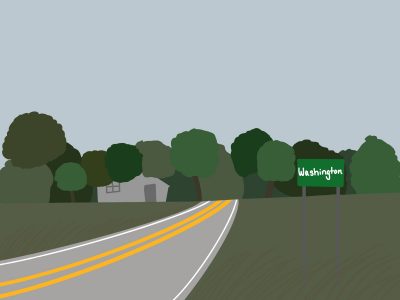Every summer of my childhood, I traveled with my family through the forested hills of northern Wisconsin to visit my grandfather. On one such drive, while watching the trees pass by the window, I remember seeing a sign for the town called Athelstane. The sign was accompanied by a peculiar adjective, and I pointed it out to my father — “What does unincorporated mean?”
The exact definition my father used has been lost to time, and was likely adjusted for my 10-year-old self, so here’s how unincorporated towns are defined by your middle school English teacher’s worst nightmare, Wikipedia, “An unincorporated area is a region that is not governed by a municipal corporation.”
These small communities do not have a local governing body, and are often under the less restrictive governance of their county. This type of living means next-to-nothing in taxes, and very few barriers for development on property. County governments, however, do not provide utilities or emergency services to the same extent that municipalities do, so plumbing and electricity must be constructed privately, often at a much higher cost.
People with a more libertarian view of the world might call this paradise. You don’t pay taxes for other people’s services, but that also means the services you want for yourself cost much more or are of lesser quality.
Living in an unincorporated area is not for everyone. Athelstane is a town of less than 600, and the shopping amenities consist of two gas stations, two restaurants and one general store. It’s not exactly a bustling metropolis, but Athelstane provides everything which is necessary for living a log cabin life in the woods of rural Wisconsin.
Revisiting Athelstane following the summer of 2020, I saw the designation of “unincorporated” in a new light. Following sustained protests of police violence, calls for defunding or dismantling municipal police forces were increasingly popular. In Athelstane, there is no municipal police department. In fact, the nearest one is 17 miles away in Crivitz, and the county police department is over 40 miles away in Marinette.

It’s difficult to find crime statistics for a town as small as Athelstane, but despite its lack of police presence, Marinette County has below average crime rates. As we have learned in the past, heavy spending on police forces doesn’t correlate to a decrease in crime. The lower crime rates in Marinette County are likely due to its below average poverty rate. When people have more economic opportunities, there is much less motivation for committing crime.
Considering that Athelstane and the 21 other unincorporated communities in Marinette County don’t have municipal police departments, it becomes clear that policing is not the ultimate requirement for a safe community.
Unincorporated communities are not exactly a beacon of urbanist paradise. These remote towns are typically very homogenous communities of white, conservative homeowners living off the grid to escape taxes, but the towns are also proof that people can coexist without relying on a law enforcement presence.
Athelstane, along with its neighbors Middle Inlet and Beaver, Wisconsin, will always have an important place in my heart, but these sorts of places aren’t only important for sentimental reasons. If we think critically about unincorporated communities, we can better understand the successes and failures of municipal governments and work to implement more sustainable forms of justice.
If you’ve never visited an unincorporated community before, and are interested in seeing what they are like, the one closest to Boston is North Salem, New Hampshire. It seems to be a quaint neighborhood of wealthy lake house owners who seek a bit of Walden naturalism in central New England.
























































































































